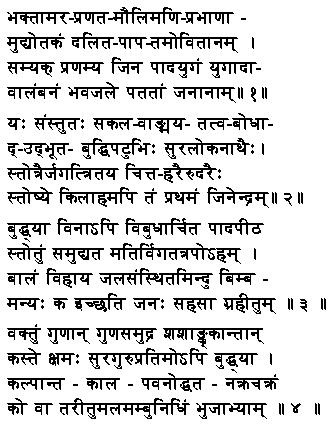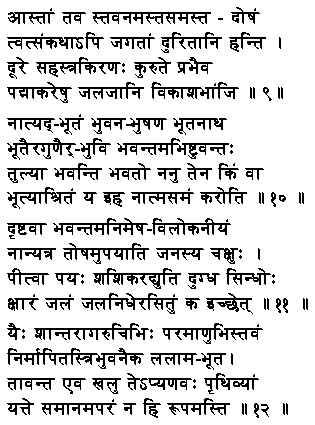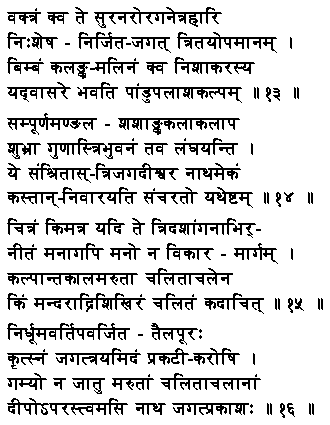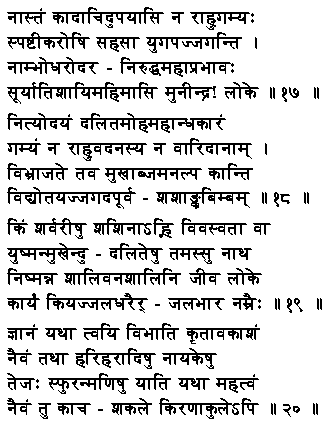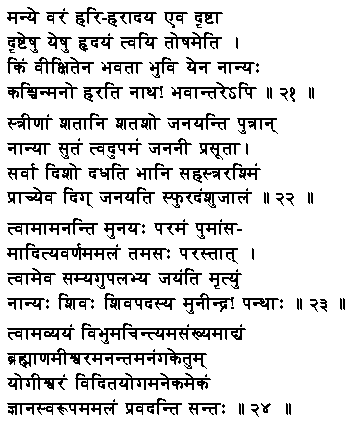| Shlokas 25-28 | |
 | buddhastvameva vibudharchita buddhi bodhat , tvam shankaroasi bhuvanatraya shankaratvat | dhataasi dhira ! shivamarga-vidhervidhanat , vyaktam tvameva bhagavan ! purushottamoasi || 25 || tubhyam namastribhuvanartiharaya natha | tubhyam namah kshititalamalabhushanaya | tubhyam namastrijagatah parameshvaraya, tubhyam namo jina ! bhavodadhi shoshanaya || 26 || ko vismayoatra yadi nama gunairasheshais - tvam sanshrito niravakashataya munisha! doshairupatta vividhashraya jatagarvaih, svapnantareapi na kadachidapikshitoasi || 27 || uchchairashoka-tarusanshritamunmayukha- mabhati rupamamalam bhavato nitantam | spashtollasatkiranamasta-tamovitanam bimbam raveriva payodhara parshvavarti || 28 || |
| As Anangketu having destroyed the sex instinct As Yogishwar being head of saints distinct As Vidityoga, having attained yogee perfection As many since each soul has distinction They call Thee one being Thyself a class As knowledge incarnate, spotless without karmas They hail Thee Buddha, being venerated by learned many Shankar as bestower of peace in the worlds den, As Narayan being the ideal soul there. My obeisance to Thee O Lord, Thou are the remover of world's misery and pain My respects to Thee O Lord, Thou driest up the ocean of wandering mundane My veneration to Thee O Lord, Thou art the world's beauty and decoration I bow to Thee O Lord Thou are the Lord of the world's population. No wonder the virtues not finding a place anywhere Found in Thee a fit receptacle and reposed there The sins and defects full of pride without care Could not dream of Thee, being accepted every where. Surrounded by spotless halo below the Ashoka tree Thy light focuses upward from Thy resplendent body free The scene is fascinating like might sun's reflection Seen through dark clouds with rays in all direction. | |
| Shlokas 29-32 | |
 | simhasane manimayukhashikhavichitre, vibhrajate tava vapuh kanakavadatam | bimbam viyadvilasadanshulata - vitanam, tungodayadri - shirasiva sahastrarashmeh || 29 || kundavadata - chalachamara - charushobham, vibhrajate tava vapuh kaladhautakantam | udyachchhashanka - shuchinirjhara - varidhara-, muchchaistatam sura gireriva shatakaumbham || 30 || chhatratrayam tava vibhati shashankakanta- muchchaih sthitam sthagita bhanukara - pratapam | muktaphala - prakarajala - vivriddhashobham, prakhyapayattrijagatah parameshvaratvam || 31 || gambhirataravapurita - digvibhagas - trailokyaloka - shubhasangama bhutidakshah | saddharmarajajayaghoshana - ghoshakah san , khe dundubhirdhvanati te yashasah pravadi || 32 || |
| . Seated on the multicoloured throne Scintillating with the most costly stone Thy speckless golden person Emanates halo in each direction Fascinates like rising sun's disc On mount top shooting rays brisk. Celestials serve Thee with chanwar white, Thy person golden then assumes a sight Most charming like froth and foam From the spring dancing on Meru's golden dome. Over Thy head are three canopies Bedecked with jewels and fine rubies Thou art world's Lord they clear And absorb the Sun's heat severe. The Dundubhi, sounds directions pierce Proclaiming Thy victory over bigotries fierce Trumpeting the true religion's eternal efficacy In bestowing on universe highest ecstasy. | |
| Shlokas 33-36 | |||||||||||||||||||||
 | mandara - sundaranameru - suparijata santanakadikusumotkara-vrishtiruddha | gandhodabindu - shubhamanda - marutprapata, divya divah patati te vachasam tatirva || 33 || shumbhatprabhavalaya - bhurivibha vibhoste, lokatraye dyutimatam dyutimakshipanti | prodyad -divakara - nirantara bhurisankhya diptya jayatyapi nishamapi soma-saumyam || 34 || svargapavargagamamarga - vimarganeshtah, saddharmatatvakathanaika - patustrilokyah | divyadhvanirbhavati te vishadarthasatva bhashasvabhava - parinamagunaih prayojyah|| 35 || unnidrahema - navapankaja - punjakanti, paryullasannakhamayukha-shikhabhiramau | padau padani tava yatra jinendra ! dhattah padmani tatra vibudhah parikalpayanti || 36 || | ||||||||||||||||||||
| Celestial Beings on Thy person shower From Kalpa tree bunches of flower Sprinkled with drops of water fragrant Touched by breeze with odour incessant. The brilliance of Thy Bhamandal bright Surpasses the most resplendent of light Eclipses numberless suns without their heat Is cool and soothing like moon lit sweet. Thy letterless speech, the authority and exposition Clear to the Seekers of Dharma and liberation Exponent of the ingredients of true religion Understood by all in their own expression. O Lord Jinendra whenever Thine holy feet Fascinating like new golden lotus sweet Attractive with shining finger nails go The celestials create beautiful lotus below.
| |||||||||||||||||||||



